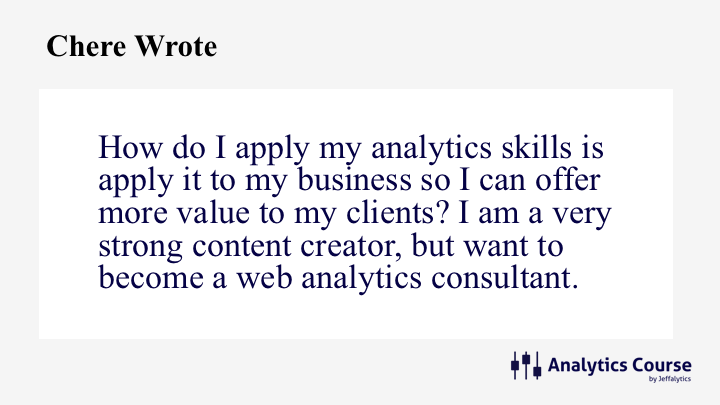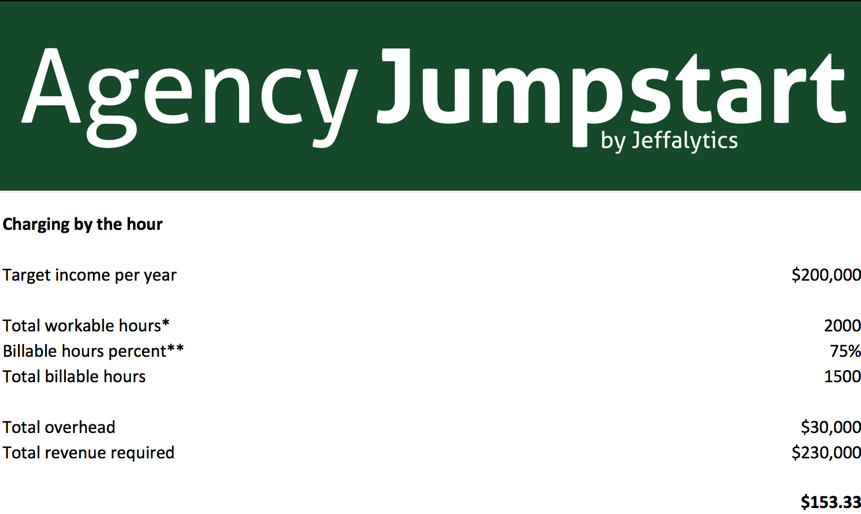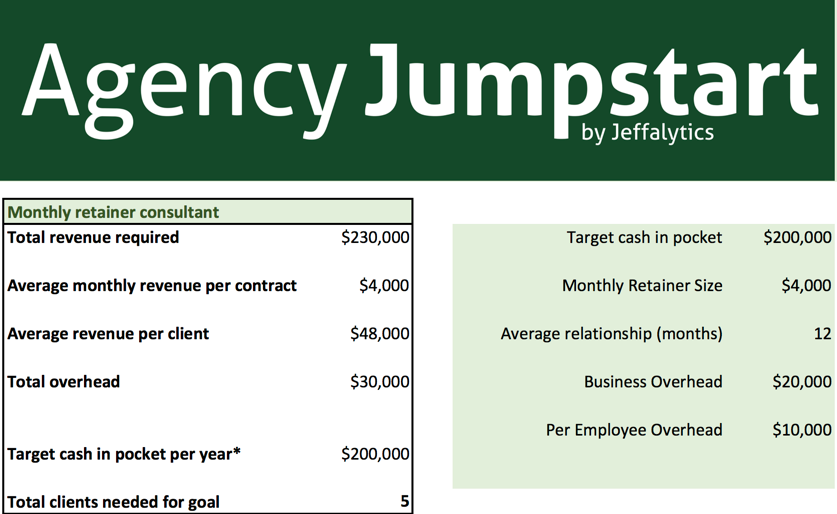So you want to be a web analytics consultant? Who wouldn’t? Web analytics consultants are the party animals of data analysis!
Plus, web analytics skills are in high demand. Consulting can be a great way to turn your skills into income.
But you have to have the right plan in place to make your consulting business work.
One of our Analytics Course students recently sent us a question about how to start marketing her analytics skills.
Becoming is a question I get a lot. So, In the post and video below, I’ll provide a detailed answer.
I will use my 12 years of experience as a web analytics consultant to share how to make a living in this business.
Chere, from our Analytics Course, wants to know how to get started as a web analytics consultant.

Here are five things you need to do to get started as a web analytics consultant
1) Set your targets
How can you hit your target income?
As a web analyst, targets should be a familiar topic. Your income target is the yearly amount of income your business needs to generate for you to make a living.
To figure out how you are going to hit your target income you have to calculate the hourly value of your work.
We can use an income model from our Agency Jumpstart Course to help you find your hourly rate.
Target hourly income calculation
In this model, we estimate that you can work 2,000 hours in a year. 2,000 hours equates to 50 standard 40-hour work weeks.
Most consultants are billable about 75% of the time they are working.
With those numbers in place, here’s how to calculate your hourly target rate:
- Add your business overhead to yearly income target.
- Then multiply the number of hours you can work (2,000) by 75% to calculate your billable hours.
- Divide the sum of your income target plus your overhead by your billable hours
- The result is your target hourly rate

2) Choose a business model
You need to choose a business model. Your business model will determine how you get paid.
One of the most common consulting business models is the monthly retainer.
A monthly retainer has many advantages over project or hourly based revenue models.
To see how the monthly retainer model works, we can use another tool from Agency Jumpstart Course (AJC).
The AJC spreadsheet helps you calculate:
- How many clients you need to land to hit your target income.
- How much overhead you can have in your business.
- And how much cash you’ll be able to generate each year.
You can download this spreadsheet here. [ddownload id=”14969″]

3) Develop relationships
Being a consultant is a relationship business. The more connections you have, the better your chances of sealing deals and reaching your income targets.
To develop business relationships, you need to put yourself out there. You have to let your network know about your business.
Here are some things you can do to help create more business relationships:
Start a blog.
Publishing blog posts can be a great way to become a thought leader in your niche.
You can also blog about how web analytics can help solve everyday problems. Remember, most people don’t even know what a web analytics consultant does. Relating your service to everyday problems will help your audience understand your value.
Create an email newsletter.
Even if you only have a small email list, a newsletter is a great way to stay in touch with your audience. You can use your email list to share your blog posts. Or you can use your email list to ask your audience questions. Learning about your email subscribers will help you build a stronger relationship with your audience.
There are many ways to let people know what you’re doing. As a consultant, you’re in charge of your business development.
Make sure to put yourself out there and let people know how you can help them.
4) Choose a niche
Once the business starts coming in, you’ll notice a wide range of need for your services.
Some clients will need you to install javascript on their websites. Others clients might want you to audit a Google Tag Manager installation.
You’re going to receive all types requests, which have you doing many different kinds of work. Working in so many different areas will prove to be very inefficient.
As an independent consultant inefficiency can stop you from achieving your revenue goals.
To make yourself more efficient, I recommend you choose two types of niches.
Client Niche
The first type of niche is client based niche. Think about the profile of your ideal client. What industry are they in? What properties do they have in common? And, what kind of business model do they use?
Then think about if you can scale working with that type of client. Are there lots of these kinds clients or just a few?
Knowing what type of client you want to work with factors into our second niche.
Service Niche
The second niche is service related. What is the ideal service you’d like to offer? You service niche needs to meet your entrepreneurial goals. But, it also needs to satisfy your business model.
Think about your service niche related to the types of clients you want to work with. Are you going to work with big companies or small companies?
Maybe you want to be a full stack web analyst, doing all the analytics work for a handful of clients.
Or maybe you want to focus on doing Google Analytics audits.
If you’re going to work on small-scale projects, you’ll need many clients. But, if you’re going to work with large companies on long-term projects, you may only need a handful of clients.
Make sure your service niche aligns with your income goals and your client niche.
5) Deliver the goods
Once you’ve identified how you’re going to make your business work, you need to able to deliver.
This comes down to making good on the services you say you can offer.
We all have to start somewhere and take on new projects. But, be clear about the services you plan to offer, and how and when you’ll fulfill your commitments.
I’ve been in web analytics consulting for a long time. And I’ve heard countless stories about consultants who didn’t deliver on their contracts.
The best way to be a successful web analytics consultant is to have lots of happy customers. Customers who recommend you to their friends and business associates.
Want to learn more about growing a freelance or consulting business?
Sign up for our Agency Jumpstart email list. Every Friday you’ll receive an email about growing a digital marketing business.
See what we did there? Email newsletter, relationship building. 😉
For more information, visit Agency Course
This post and video was episode 5 in our 90 Day Challenge digital marketing series.
To get access to all 90 days of videos, subscribe to our YouTube channel. YouTube will send our subscribers weekly emails about all the videos we published over the past week.
Want to know about each video and post as soon as it comes out? Sign up for the 90-day challenge email newsletter. The newsletter will be the best way to make sure you don’t miss any of the content.

Leave a Reply
You must be logged in to post a comment.